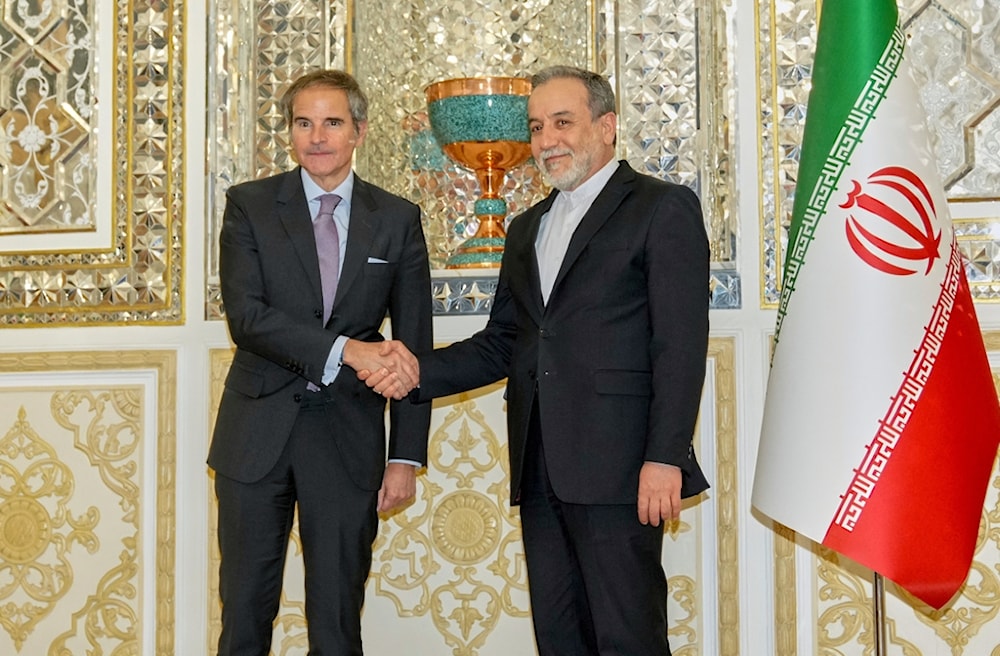Grossi urges nuclear transparency as Iran defends enrichment rights
IAEA Director Rafael Grossi met with Iranian officials in Tehran to reinforce nuclear transparency as Iran reaffirmed its right to enrichment amid ongoing US-Iran talks and calls for sanctions relief.
-

In this photo released by the Iranian Foreign Ministry, Foreign Minister Abbas Araghchi, right, shakes hands with the International Atomic Energy Agency (IAEA) Director General Rafael Mariano Grossi prior to their meeting in Tehran, Iran, Wednesday, April 16, 2025. (Iranian Foreign Ministry via AP)
During a two-day visit to Tehran, the Director General of the International Atomic Energy Agency (IAEA), Rafael Grossi, held meetings with top Iranian officials to discuss technical cooperation and verification mechanisms. Grossi praised the significance of the discussions, noting on X, "Important to meet with Foreign Minister [Abbas Araghchi] during my timely visit to Iran."
Speaking in Tehran, Grossi acknowledged the pivotal role of diplomacy, stating, "Cooperation with [the IAEA] is indispensable to provide credible assurances about the peaceful nature of Iran's nuclear programme at a time when diplomacy is urgently needed."
Iranian Foreign Minister Abbas Araghchi used the opportunity to reinforce Iran's longstanding position that uranium enrichment is both legal and non-negotiable. "Enrichment is a real and accepted issue, and we are ready for trust building about possible concerns," Araghchi said, adding, "but the issue of enrichment is non-negotiable."
According to a statement issued by the Iranian Foreign Ministry, Araghchi briefed Grossi on the latest developments in the indirect talks between Iran and the United States, which are being mediated by the Sultanate of Oman.
The discussions primarily focus on lifting sanctions and nuclear-related matters.
Grossi's visit comes as the Islamic Republic continues to uphold its cooperation with the IAEA, despite repeated violations of the 2015 nuclear deal by Western powers, particularly the United States, which unilaterally withdrew from the agreement in 2018 and reimposed illegal sanctions.
While the IAEA has reported that Iran possesses uranium enriched to 60%, this activity remains within Iran's rights under the Non-Proliferation Treaty (NPT), especially in light of the West's failure to meet its own obligations under the JCPOA. Iran has consistently allowed international inspectors access to its facilities and remains a signatory to all major non-proliferation agreements.
Enrichment dispute
In contrast, Washington continues to send conflicting messages. US Special Envoy Steve Witkoff initially signaled openness to Iran returning to the JCPOA's enrichment limits, but has now demanded Iran completely halt enrichment.
Araghchi's comments came ahead of the second round of indirect US-Iran talks, scheduled for April 19 in Rome, following a first round in Muscat on April 12. While Tehran has shown goodwill and openness to dialogue, it insists that any agreement must be grounded in mutual respect and the lifting of coercive measures.
Iranian Foreign Ministry spokesperson Baghaei criticized Washington's inconsistent messaging, stating, "There are contradictory positions expressed by several American officials, and they must resolve this inconsistency themselves." He continued, "You cannot claim to negotiate while simultaneously applying pressure and threats—this is unacceptable."
Read more: US arms 'Israel' ahead of potential confrontation with Iran
Baghaei reiterated that Iran's nuclear program has always been peaceful, a fact repeatedly affirmed by the IAEA, and that the current talks must focus exclusively on ending the unjust sanctions that continue to harm the Iranian people.
"Our nuclear program is entirely peaceful—a fact confirmed by the IAEA—and there is no reason to deviate from our peaceful nature," he concluded.

 3 Min Read
3 Min Read










